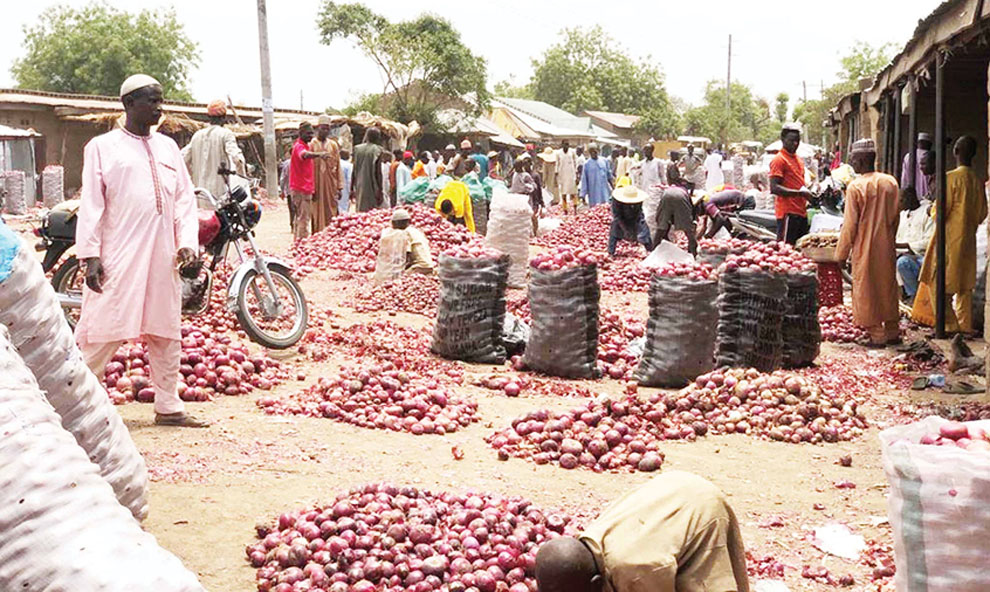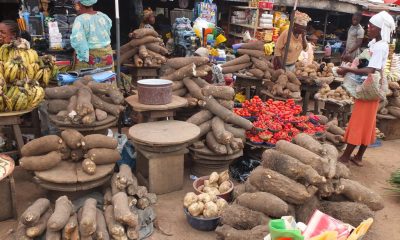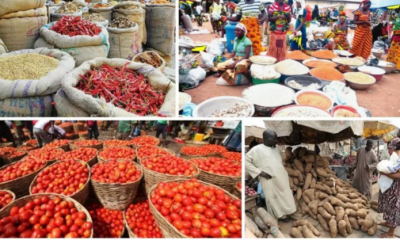Business
Onion price rises over 100%, flooding, inflation blamed

Onion price rises over 100%, flooding, inflation blamed
For many homes, onion is already an item that is too expensive to afford and an alternative is needed on their menu. This is even as the price of the nutritious vegetable is forecasted to remain high for a long time.
A Daily Trust market survey across three major cities showed that the prices of the spice along with others are on the upward trajectory.
In Kano, our correspondent revealed that a big bag of onion is sold at N250,000 as against last year’s price of N120,000 and the medium bag is now selling at N180,000 as against N80,000 last year.
In Jos, the Plateau State capital, our correspondent reported similar prices as a bag is now N250,000 while the half bag, is sold at N125,000, and that there are other varieties with prices ranging from N215,000 to N230,000 for the same size bag.
The secretary of Farin Gada Vegetable Market in Jos, Musa Ubale, said the current price of onions (N250,000 a bag) has remained so for some time now, while it was hitherto sold at about N170,000 for the same quantity.
For pepper, he said the big bag goes for between N40,000 and N45,000, while smaller ones are sold for between N30,000 and N35,000.
The leadership of onion farmers in Kano State told our correspondent that the current scarcity and high price of onion may remain beyond this year’s harvest due to several reasons.
However, the president of the National Onion Producers, Processors and Marketers Association of Nigeria, Alhaji Aliyu Isa Maitasamu, told our correspondent in Sokoto that the increase was due to inflation which he said shot the price of seed to increase by 150 per cent – from N50,000 to N150,000 – as well as the high prices of chemicals and fertilisers.
READ ALSO:
- Northern youths say new tax regime bill designed to ruin region
- Syria not threat to world, rebel leader al-Sharaa tells BBC
- Tinubu’s 2025 budget will increase poverty, worsen economy – PDP
He also attributed the drop in supply to flood disasters experienced in the onion-producing belt and the scarcity of seeds, all contributing to the soaring price of the commodity in the country.
According to him, the flood disasters had affected Sokoto, Zamfara, Kebbi and Borno which were known for producing onions.
Musa Ubale, the secretary of Farin Gada Vegetable Market in Jos, also told our correspondent that part of the reason for the rise in the prices of the vegetables, especially pepper, is that people from neighbouring countries like Cameroon and Ghana do come to purchase them in large quantities.
But one of the onion farmers in Kano State, Alhaji Sama’ila Nura, cited another factor responsible for onion scarcity in Kano as the absence of onion supply from Gada in Niger Republic and some other places that used to complement the Nigerian onion production every year.
“Every year onion supplied from Niger Republic and some other places closer to Nigeria played a very vital role in complementing the Nigerian production. Unfortunately, with the military junta in Niger Republic, not a single supply was received from there.
“Moreover, the high cost of agro-inputs in Nigeria also contributed to the low production of onions during the wet season, with only Kano and Jigawa states producing onion during the wet season, coupled with poor storage methodologies,” he stated.
Currently, planting and other activities for dry season onion production for the year 2025 have commenced.
Our correspondent who visited the Kadawa irrigation site and Garun Malam irrigation site reported vast onion plantations for the season, even though farmers are still lamenting the high cost of inputs.
READ ALSO:
- Real Madrid outclass Pachuca to win FIFA Intercontinental Cup
- Israel hits ports, energy sites in Yemen after missile intercepted
- Gaza mediators intensify ceasefire efforts, Israeli strikes kill 20 people
The current prices of onion seed and other inputs are contributing to the high price heat felt in many homes.
A check conducted in the seed’s open market in Kano shows that a cup of onion seed is sold at N30,000 while a measure (mudu) costs about N130,000.
Sources at the market revealed that this is the highest price that onion seed has ever attained in the last decade. A single bed of onion seedlings is now sold at N100,000 to N105,000 as against N8,000 to N10,000 last year.
Another farmer, Ibrahim Abbah, opined that the chances that the price will go down as expected is very slim due to the increase in demand from other countries.
“It will interest you to note that demand for onion from Nigeria has been on the rise recently. Ironically, Nigeria now supplies Ghana, Benin Republic among other African countries. This is what caused the scarcity sooner than expected; because they have moped up all the excess onions we have here,” he said.
An ex-official of the Onion Farmers Association of Nigeria, Malam Mustapha Adam, said there are various factors that have contributed to the current scarcity of onion in the country.
“The demand for onion has increased drastically; some sources were telling us that Nigerian onions are now being exported to countries like China and India. This development has contributed to its scarcity, and the high cost of seed and other agro-inputs have also triggered the price hike.
“Unfortunately, despite the huge revenue generated to states by onion farming, onion farmers have never accessed any form of grant from the federal government. We have never been included in the various federal government’s agricultural intervention programmes,” he said.
With this changing dynamic in the onion and pepper supply chain, Nigerian kitchens will have to brace up for the additional challenge.
Onion price rises over 100%, flooding, inflation blamed
Daily Trust
Railway
Lagos Rail Mass Transit part of FG free train ride – NRC

Lagos Rail Mass Transit part of FG free train ride – NRC
The Nigerian Railway Corporation (NRC) has disclosed that the Lagos Rail Mass Transit (LRMT) trains are included in the Federal Government’s free train ride initiative for the Christmas and New Year celebrations.
The LRMT, which currently includes the Phase 1 Blue Line Rail and the Phase 1 of the Red Line Rail, operates under the Lagos Metropolitan Area Transport Authority (LAMATA).
This announcement was made by Ben Iloanusi, the Acting Managing Director of the NRC, during an interview on NTA News TV on Friday, following the launch of the initiative earlier that day.
While Iloanusi stated that Phase 1 of both the Blue Line and Red Line Rail projects are part of the program, LAMATA has yet to confirm this inclusion.
READ ALSO:
- Nigeria denies alleged plot to destabilise Niger Republic
- Navy arrests 19 Nigerians attempting to reach Europe by hiding on ship
- Troops arrest four Ambazonian rebels in Taraba
Iloanusi outlined the other routes benefiting from the scheme, which include the Lagos-Ibadan Train Service, Kaduna-Abuja Train Service, Warri-Itakpe Train Service, Port Harcourt-Aba Train Service, and the Bola Ahmed Tinubu Mass Transit in Lagos. Notably, little was previously known about the Bola Ahmed Tinubu Mass Transit service until this disclosure.
“Let me mention the routes where this free train service is happening. We have the Lagos-Ibadan Train Service, we have the Kaduna-Abuja Train Service, we have the Warri-Itakpe Train Service, we have the Lagos Rail Mass Transit trains, we have the Port Harcourt-Aba Train Service, and we have what we call the Bola Ahmed Tinubu Mass Transit, which is also in Lagos,” he stated.
Iloanusi provided operational updates, stating that passengers nationwide can access free tickets online or, for those unable to do so, at train stations where they will be profiled and validated.
He noted that passengers using NRC-managed services (excluding the Lagos Rail Mass Transit) should reserve tickets via the official website, www.nrc.gov.ng, with a valid ID required. He also advised travelers to plan, arrive on time, and bring valid identification.
Lagos Rail Mass Transit part of FG free train ride – NRC
Business
NNPC denies claim of Port Harcourt refinery shutdown

NNPC denies claim of Port Harcourt refinery shutdown
The Nigerian National Petroleum Company Limited (NNPCL) has denied claims in media reports that the newly refurbished Port Harcourt refinery has shut down.
The national oil company denied the claim in a press release issued by its Chief Corporate Communications Officer, Olufemi Soneye, on Saturday.
Soneye said the claim was false and urged Nigerians to disregard it. He stressed that the Port-Harcourt Refinery is fully operational.
READ ALSO:
- Like Ibadan, stampede claim 10 lives for Abuja Catholic church, 17 in Anambra
- Marketers react after NNPCL slashes petrol price to N899 per litre
- Electricity: We installed 184,507 meters, issued 50 licences in Q3, says FG
The statement read, “The attention of the Nigerian National Petroleum Company Limited (NNPC Ltd.) has been drawn to reports in a section of the media alleging that the Old Port Harcourt Refinery which was re-streamed two months ago has been shut down.
“We wish to clarify that such reports are totally false as the refinery is fully operational as verified a few days ago by former Group Managing Directors of NNPC.”
He noted that preparation for the day’s loading operation is currently ongoing, and added that claims of the shutdown are “figments of the imagination of those who want to create artificial scarcity and rip-off Nigerians.”
NNPC denies claim of Port Harcourt refinery shutdown
Business
CBN permits BDCs to buy up to $25,000 FX weekly from NFEM

CBN permits BDCs to buy up to $25,000 FX weekly from NFEM
The Central Bank of Nigeria (CBN) has granted Bureau de Change (BDC) operators temporary permission to purchase up to $25,000 weekly in foreign exchange (FX) from the Nigerian Foreign Exchange Market (NFEM).
The Central Bank of Nigeria (CBN) has granted Bureau de Change (BDC) operators temporary permission to purchase up to $25,000 weekly in foreign exchange (FX) from the Nigerian Foreign Exchange Market (NFEM).
This move, detailed in a circular dated December 19, 2024, is designed to meet seasonal retail demand for FX during the holiday period.
The circular was signed by T.G. Allu, on behalf of the Acting Director of the Trade and Exchange Department.
The arrangement will be in effect from December 19, 2024, to January 30, 2025.
Under the directive, BDCs may purchase FX from a single Authorized Dealer of their choice, provided they fully fund their accounts before accessing the market.
Transactions to occur at the prevailing NFEM rate
The transactions will occur at the prevailing NFEM rate, and BDCs are required to adhere to a maximum 1% spread when pricing FX for retail end-users.
READ ALSO:
- Badenoch’s negative portrayal of Nigeria Police unfair-PCRC
- Bitcoin price crashes to $95,000 as market continues to react to Federal rate cuts
- Bauchi high court dismisses blasphemy, cybercrime charges against Rhoda Jatau
All transactions conducted under this scheme must be reported to the CBN’s Trade and Exchange Department.
The circular read in part:
“In order to meet expected seasonal demand for foreign exchange, the CBN is allowing a temporary access for all existing BDCs to the NFEM for the purchase of FX from Authorised Dealers, subject to a weekly cap of USD 25,000.00 (Twenty-five thousand dollars only).
This window will be open between December 19, 2024 to January 30, 2025.
“BDC operators can purchase FX under this arrangement from only one Authorized Dealer of their choice and will be required to fully fund their account before accessing the market at the prevailing NFEM rate. All transactions with BDCs should be reported to the Trade and Exchange department, and a maximum spread of 1% is allowed on the pricing offered by BDCs to retail end-users.”
The CBN assured the general public that PTA (Personal Travel Allowance) and BTA (Business Travel Allowance) remain available through banks for legitimate travel and business needs.”
These transactions are to be conducted at “market-determined exchange rates” within the NFEM framework.
This initiative reflects the CBN’s strategy to stabilize the FX market and manage seasonal surges in demand.
CBN permits BDCs to buy up to $25,000 FX weekly from NFEM
-

 Railway10 hours ago
Railway10 hours agoLagos Rail Mass Transit part of FG free train ride – NRC
-

 metro1 day ago
metro1 day agoCourt stops customs from seizing imported rice in open market
-

 metro2 days ago
metro2 days agoFG transfers electricity market regulatory oversight in Lagos to LASERC
-

 metro2 days ago
metro2 days agoAfe Babalola: Court grants Dele Farotimi bail, barred from media interviews
-

 metro2 days ago
metro2 days agoIbadan stampede: Tinubu orders probe as death toll hits 40
-

 News2 days ago
News2 days agoAdebayo Ogunlesi, 2 other Nigerians make Forbes 50 wealthiest Black Americans list 2024
-

 metro3 days ago
metro3 days agoAbuja demolition: Soldiers attack FCTA officials, seize vehicles
-

 metro20 hours ago
metro20 hours agoIbadan stampede: Ooni reacts after arrest of ex-wife













